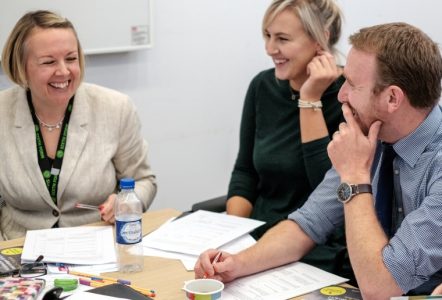Digital T-level co-location projects: updates from the first cohorts
- 11th Sep 2025
- Natasha Watkinson

In 2024 an approach was launched to support more micro, small and medium enterprises with their talent pipeline by engaging with T-levels. The first two projects are led by Tech Cornwall (TC) and Sunderland Software City (SSC); networking and membership organisations whose aim is to support the development of their local digital and tech sectors. The models they have developed make it easier for these businesses to reach up-and-coming talent by engaging with T-level industry placements.
Overview
Both SSC and TC are taking on the role of employer, with responsibility for:
Each organisation is making full use of their industry contacts to build a pipeline of new employers and projects. For example, Tech Cornwall is using events such as the Big Cornwall Tech Showcase to publicise students’ completed work to demonstrate their capability and the value they can bring for a business. This has attracted additional employers to the co-location model and also given students exposure to industry events.
Project working
Both organisations fulfil commercial client briefs and have given their T-level students experience of this approach – including initial briefings with the client employers, providing progress updates, and making final presentations of completed solutions. The students are involved as part of the development team at each stage, gaining experience of interacting with different organisations, and responding to the needs of clients.
While local businesses are the focus of the business networks, there is scope to bring in client work from further afield. The co-location model avoids the need for reliance on remote working for placements, so that students gain direct experience of attending the workplace. It gives students in rural or more remote locations easier access to employer client work where they can travel to the co-location hub site.
Projects worked on by the first cohort of students have included:
Some employers have used the additional capacity offered by T-level students to support with business-critical projects, while others have focused on projects that had been ‘on the shelf’, awaiting capacity to become available.
To encourage students to mix with others in the workplace they are located at desks alongside a range of teams. For example, SSC situated a newly hired team of junior developers in a workspace with the students to facilitate their integration into the wider team. As the placements progressed, they reported increases in student confidence to consult with colleagues as issues arose, both in-person and through industry project management software.
Employers
Many of the businesses involved had not yet explored the talent pipeline offered by T-levels due to a variety of factors including not having their own premises, or a lack of awareness of T-levels and students’ capabilities.
Their roles on the project include:
The client businesses see placement students in action as they work on their solutions, which in turn increases their confidence and understanding of what T-level students can do. This experience opens these businesses to potentially hosting students directly in future.
Students
Students have enjoyed gaining experience in the workplace, the relevance of the work they are undertaking to their T-level curriculum, and the insight it gives them about possible future careers. Many students have reported being able to use examples from the work they have completed on placement in their assessments.
SSC are giving students access to their networks of contacts and encouraging them to reach out to linked employers now and in future to develop career links. They report that the direct interaction with client employers through stand ups and project meetings has built sufficiently strong relationships that future job applications from these students would be viewed favourably, even for students who choose to undertake further study (such as a higher technical qualification or undergraduate degree) before seeking work.
The strong industry links and in-house expertise of SSC and TC give students placement experiences that are highly relevant to their T-level programmes, as well as supporting exposure to a wide variety of occupations with digital employers.
Working with T-level providers
Providers report that they value this model as a new option for sourcing industry placements. In some circumstances it has addressed challenges around location and transport availability to employer bases, particularly in Cornwall where the labour market is more dispersed.
As with any industry placement, T-level providers are responsible for:
In a multi-stakeholder model, and with cohorts of several students, it is especially important that communication is clear, consistent and timely.
Next steps
A second cohort of T-level students will begin placements from the 2025/26 academic year.
The host organisations will also begin exploring with providers whether the surety of high-quality placement opportunities offered by these models would enable them to contribute to ongoing operational costs. They will also begin to set out proposals for charging appropriate fees to client employers for high-quality work completed by teams including T-level students.
Additionally, the organisations are exploring the feasibility of co-locating employers into the workspaces to increase their direct contact time with students.
A third project – led by Greater Manchester Combined Authority (GMCA) in partnership with Manchester Digital – will also come onstream for the next academic year. A full report on the models delivered in each of the three regions will be published in late 2026.
Testimonials
Governance, Risk and Compliance Analyst, Boo Consulting:
“After we delivered a short pitch to the students assigned to our project, they showed enthusiasm and creativity right from the start! After six weeks, we received the final product and were truly amazed by it. Based on our conversations with the students during the project, we had high expectations, and they exceeded those expectations.”
Founder, Iteracy:
“Working with Brandon and Levi on a T-level project was immensely rewarding. We were developing a new feature for a website which worked well as a standalone project. They brought fresh thinking to the task and definitely came up with ideas that hadn’t occurred to us.”
Sales & Marketing Director, Layers Studio:
“By operating in this way, we can provide support to many more students that we otherwise wouldn’t have the space or resources to facilitate.”
Student, City College Plymouth
“Apart from the technical knowledge I acquired, the experience also exposed me to various careers in technology. I was able to meet experts, learn about various careers and companies, and realize the expectations of the employer.
Overall, the experience has made me more competent and self-assured and more aware of career choices for the future.”
Further information
Natasha Watkinson (Project Manager), natasha.watkinson@gatsby.org.uk

21st Jan 2026

18th Dec 2025

16th Dec 2025